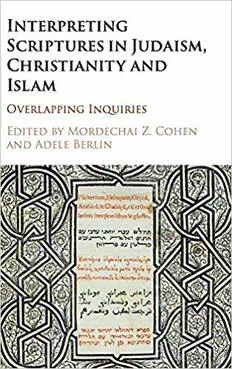
Interpreting Scriptures in Judaism, Christianity and Islam: Overlapping Inquiries PDF
Preview Interpreting Scriptures in Judaism, Christianity and Islam: Overlapping Inquiries
INTERPRETING SCRIPTURES IN JUDAISM, CHRISTIANITY AND ISLAM This comparative study traces Jewish, Christian, and Muslim scrip- tural interpretation from antiquity to modernity, with special emphasis on the pivotal medieval period. It focuses on three areas: responses in the different faith traditions to tensions created by the need to transplant scriptures into new cultural and linguistic con- texts; changing conceptions of the literal sense and its importance vis-à-vis non-literal senses, such as the figurative, spiritual, and mid- rashic;andwaysinwhichclassicalrhetoricandpoeticsinformed–or were resisted in – interpretation. Concentrating on points of inter- section, the authors bring to light previously hidden aspects of methods and approaches in Judaism, Christianity, and Islam. This volume opens new avenues for interdisciplinary analysis and will benefit scholars and students of biblical studies, religious studies, medieval studies, Islamic studies, Jewish studies, comparative religions,and theory of interpretation. mordechai z. cohen isProfessorofBibleandAssociateDeanof the Bernard Revel Graduate School of Jewish Studies at Yeshiva University. His publications include Three Approaches to Biblical Metaphor: From Abraham Ibn Ezra and Maimonides to David Kimhi and Opening the Gates of Interpretation: Maimonides' Biblical HermeneuticsinLightofHisGeonic-AndalusianHeritageandMuslim Milieu. adele berlin is Robert H. Smith Professor of Hebrew Bible Emerita in the Department of English and the Jewish Studies Program at the University of Maryland. She is the author of seven books, including Poetics and Interpretation of Biblical Narrative, The Dynamics of Biblical Parallelism, and commentaries on Zephaniah, Esther, and Lamentations. INTERPRETING SCRIPTURES IN JUDAISM, CHRISTIANITY AND ISLAM Overlapping Inquiries edited by MORDECHAI Z. COHEN AND ADELE BERLIN with the assistance of meir m. bar-asher, rita copeland, and jon whitman UniversityPrintingHouse,CambridgeCB28BS,UnitedKingdom CambridgeUniversityPressispartoftheUniversityofCambridge. ItfurtherstheUniversity’smissionbydisseminatingknowledgeinthepursuitof education,learningandresearchatthehighestinternationallevelsofexcellence. www.cambridge.org Informationonthistitle:www.cambridge.org/9781107065680 ©CambridgeUniversityPress2016 Thispublicationisincopyright.Subjecttostatutoryexception andtotheprovisionsofrelevantcollectivelicensingagreements, noreproductionofanypartmaytakeplacewithoutthewritten permissionofCambridgeUniversityPress. Firstpublished2016 PrintedintheUnitedKingdombyClays,StIvesplc AcataloguerecordforthispublicationisavailablefromtheBritishLibrary LibraryofCongressCataloguinginPublicationdata InterpretingscripturesinJudaism,Christianity,andIslam:overlappinginquiries/editedby MordechaiZ.CohenandAdeleBerlin;withtheassistanceofMeirM.Bar-Asher,RitaCopeland, andJonWhitman. pages cm Includesbibliographicalreferencesandindex. isbn978-1-107-06568-0(Hardback) 1. Sacredbooks–Historyandcriticism. 2. Judaism. 3. Christianity. 4. Islam. I. Cohen, MordechaiZ.,editor. bl71.1592015 2080.2–dc23 2015032421 isbn978-1-107-06568-0Hardback Additionalresourcesforthispublicationatwww.yu.edu/revel/interpreting-scriptures CambridgeUniversityPresshasnoresponsibilityforthepersistenceoraccuracy ofURLsforexternalorthird-partyinternetwebsitesreferredtointhispublication, anddoesnotguaranteethatanycontentonsuchwebsitesis,orwillremain, accurateorappropriate. Contents List of figures page vii Notes on contributors ix Acknowledgments xiii List of abbreviations xv Introduction: Intersecting encounters with scriptures in three faiths 1 Mordechai Z. Cohen part i scriptural texts in changing contexts 23 1 The emergence of biblical interpretation in antiquity 25 James L. Kugel 2 Disclosing the mystery: the hermeneutics of typology in Syriac exegesis 46 Sidney H.Griffith 3 “We have made it an Arabic Qur’an”: the permissibility of translating scripture in Islam in contrast with Judaism and Christianity 65 MeirM. Bar-Asher 4 The unmoved mover begins to move: literary and artistic renderings of the Christian Bible 84 PieroBoitani 5 Deconstructing the dual Torah: a Jewish response to the Muslim model of scripture 113 Meira Polliack v vi Contents part ii conceptions of the literal sense 131 6 The literal sense of Christian scripture: redefinition and revolution 133 Jon Whitman 7 Figuring the letter: making sense of sensus litteralis in late-medieval Christian exegesis 159 AlastairJ.Minnis 8 Conceptions of the literal sense (zāhir, haqīqa) in Muslim _ _ interpretive thought 183 Robert M.Gleave 9 Emergence of the rule of peshat in medieval Jewish Bible exegesis 204 MordechaiZ.Cohen part iii rhetoric and the poetics of reading 225 10 Poetry and commentary in the medieval school of Rheims: reading Virgil, reading David 227 A.B. Kraebel 11 On the figurative (majāz) in Muslim interpretation and legal hermeneutics 249 Wolfhart P. Heinrichs 12 Words of eloquence: rhetoric and poetics in Jewish Bible exegesis in its Muslim and Christian contexts 266 Mordechai Z. Cohen 13 Classical rhetoric and medieval scriptural interpretation in the Latin West 285 Rita Copeland 14 Robert Lowth’s biblical poetics and romantic theory 309 StephenPrickett 15 From scripture to literature: modern ways of reading the Bible 326 Adele Berlin Bibliography 336 General index 371 Scriptural index 379 Figures 4.1 Tapiz de la Creación (Creation Tapestry), Girona Cathedral, c. 1100. page 89 4.2 Tapiz de la Creación, restored by el Centro de Restauración de Bienes Muebles, 2012. 90 4.3 Monreale Cathedral, nave, south wall, Creation mosaics, late 12th century, detail of Light and Angels. 93 4.4 Monreale Cathedral, nave, south wall, Creation mosaics, late 12th century, the Beginning. 94 4.5 San Clemente, Rome, apse of upper church, mosaic, c. 1130. 96 4.6 San Clemente, Rome, apse of upper church, mosaic, detail of the Hand of God. 97 4.7 San Marco, Venice, narthex, mosaic, 1215–35, dome with Genesis scenes. 98 4.8 Chartres Cathedral, north transept, portal sculpture, 1194–1230, first day of Creation. 100 4.9 Chartres Cathedral, north transept, rose window, stained glass, 1230–35, Christ creates the cosmos. 101 4.10 Giovanni di Paolo, Creation of the World and Expulsion from Paradise, tempera and gold on wood, 1445, Metropolitan Museum of Art, New York (Robert Lehman Collection, 1975). 106 4.11 Perugino, God the Creator, fresco, 1507–08, ceiling of the Stanza dell’Incendio di Borgo, Vatican. 107 4.12 Raphael, The Prime Mover, fresco, 1509–11, ceiling of the Stanza della Segnatura, Vatican. 108 4.13 Michelangelo, Separation of Light and Darkness, fresco, 1512, ceiling of the Sistine Chapel, Vatican. 109 4.14 Michelangelo, Separation of Water and Dry Land, fresco, 1512, ceiling of the Sistine Chapel, Vatican. 110 4.15 Michelangelo, Creation of Sun, Moon, and Planets, fresco, 1512, ceiling of the Sistine Chapel, Vatican. 111 vii viii List of figures Plate in Chapter 10 Rheims, Bibliothèque municipale, MS 133, f. 4v, gloss on Psalms 2:13–3:4. 236 The figures appearing in this volume in black and white can be viewed in full color at www.yu.edu/revel/interpreting-scriptures Figure 4.1 also appears in full color on the back jacket cover.
